An Interview with Adrian "The Hunter" Pang, Legend FC Lightweight Champion
by Lee Li
 While the Asian MMA scene outside of Japan has only begun to take off in the last few years with promotions such as China's Art of War, Hong Kong's Legend FC, Singapore's Martial Combat and One FC, and the Philippines' URCC, the folks "Down Under" have been banging it out a little longer. Australia and New Zealand have witnessed a boom since 2000. Promotions like Spartan RF, Xtreme FC, and later Cage Fighting Championship, Nitro and Rize may be mostly regional in appeal but they show how popular the sport is in this culturally "Western" (though isolated from it) South Pacific Rim area. The mega-promotion Ultimate Fighting Championship held events in Sydney in 2010 and 2011 - even prior to a return to Japan (the country long believed the hotspot of MMA in the eastern hemisphere) in 2012.
While the Asian MMA scene outside of Japan has only begun to take off in the last few years with promotions such as China's Art of War, Hong Kong's Legend FC, Singapore's Martial Combat and One FC, and the Philippines' URCC, the folks "Down Under" have been banging it out a little longer. Australia and New Zealand have witnessed a boom since 2000. Promotions like Spartan RF, Xtreme FC, and later Cage Fighting Championship, Nitro and Rize may be mostly regional in appeal but they show how popular the sport is in this culturally "Western" (though isolated from it) South Pacific Rim area. The mega-promotion Ultimate Fighting Championship held events in Sydney in 2010 and 2011 - even prior to a return to Japan (the country long believed the hotspot of MMA in the eastern hemisphere) in 2012.
Australia has produced or adopted several notable athletes who have achieved international recognition in the UFC. James Te Huna, an ethnic Maori light heavyweight, punched his way through every opponent in Australia, earning him a spot on the card for UFC 127 in Sydney. Brian Ebersole, the guy who shaves an arrow in his chest hair pointing to his chin for his opponents, hasn't been knocked out in 64 fights. He's from the US but he's made Australia his home since 2007. George Sotiropoulos began fighting MMA in Australia and fought all over the Pan-Pacific region until being recruited to The Ultimate Fighter TV show which launched his career in the UFC. He twice fought another Aussie by the name of Kyle "KO" Noke - once to a loss, once to a win - who was a bodyguard for Steve Irwin. Noke was on a near perfect winning streak in local promotions when he too was catapulted into the international spotlight with a position on TUF. He trains with Team Jackson and Integrated MMA in Australia with another well-known fighter in the Pan-Pacific region: Adrian Pang.
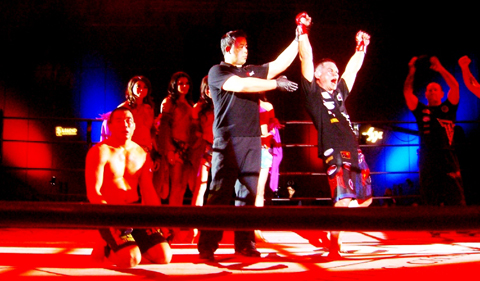
Saying Adrian "The Hunter" Pang is well-known in Asia and Australia is almost not doing him enough justice. This is a man with a winning professional fight career spanning ten years (19W-7L-2D). That extraordinary length of time is a monumental achievement for any athlete, and Pang shows no signs that he's affected by it. In fact, he seems to be arriving at his peak: in the last two years he's won two lightweight titles from Cage Fighting Championship in Australia and Legend Fighting Championship in Hong Kong. He's not slowing down either. He fought four times in 2010, and after winning his title fight with Legend FC in the beginning of 2011, he went right back into training for a CFC fight only four months later. On October 30, "The Hunter" will be making his first title defense back in Hong Kong against Mongolian Jadamba Narantungalag, a fighter with a less prolific career than Pang but some wins over stellar opponents such as Akihiro Gono and Kazunori Yokota.
If Pang's fight career seems impressive, it only attests to his entire life. He was born of Chinese-European ancestry and raised in a tribal area of Papau New Guinea. This was not an easy childhood. Imagine growing up in a neighborhood where you don't have to worry about fast cars or stray bullets, but spears and knives. Pang was never one to back down, just like his fights prove: he's gone the distance - including two 5-round championships - in almost half of his fights. As a kid they called him man bilong pait, which means "warrior" or "man who likes to fight." You can ask him about the last cut on his brow from an MMA fight, but it's more interesting to ask him about that scar on his arm - it came from a spear fight in his youth!
Adrian is generously taking time out of his training for his first Legend FC Lightweight Championship title defense on October 30 to let me speak with him about his life, his family and his epic career. Thank you, Adrian.
LL: So first off, how does a Sino-European family end up in Papua New Guinea?
AP: My father was born in PNG after his parents migrated there from China before the war. His parents both suffered the brutalities of POW camps at the hands of the Japanese during WW2. My mother's father captained ships throughout New Guinea during the war as well and took a liking to the place. He moved with my grandmother and my mother there. He operated a shipping company in PNG until his retirement.
LL: You are truly a second generation PNGer! What was it like growing up there and with the ethnic Tolai people from the region?
AP: Growing up in PNG was a lot different than what most people may be used to but it was normal to us. We lived in a remote part outside of the main town and my father operated a trading store at the time. It was right on the beach and surrounded by tropical rainforest, caves and wrecks from the war. Most of our friends were Tolai-ethnic people and to this day are still some of my most loyal friends.
LL: You make it sound like an island paradise, not a fierce tribal jungle. How did that environment lead you to pursue martial arts?
AP: Actually, it was often a violent and lawless place; I quickly learned the values of honor and respect as well as defending myself and those less unfortunate. In that environment, being a martial artist was developing within me even without a master.
LL: Well, at some point you must have decided to learn something formally. Why did you choose to study Chow Gar Tong Long kung fu?
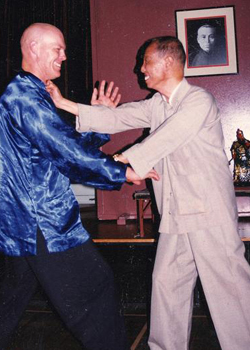 AP: I didn't actually choose Chow Gar Tong Long, but I always wanted to follow my heritage by doing Chinese kung fu. As most youngsters I was heavily influenced by Bruce Lee and would watch his movies constantly. I did study a similar style of kung fu back then, when a mechanic I knew mentioned that he knew this kung fu guy who had the same car as me - we were both early Ford Falcon GT enthusiasts. It turns out this "kung fu guy" had just come back from Asia and was living literally across the road. Well, being young and brash I thought, "Yeah, I'll go see this guy and show him how hard my kung fu is."
AP: I didn't actually choose Chow Gar Tong Long, but I always wanted to follow my heritage by doing Chinese kung fu. As most youngsters I was heavily influenced by Bruce Lee and would watch his movies constantly. I did study a similar style of kung fu back then, when a mechanic I knew mentioned that he knew this kung fu guy who had the same car as me - we were both early Ford Falcon GT enthusiasts. It turns out this "kung fu guy" had just come back from Asia and was living literally across the road. Well, being young and brash I thought, "Yeah, I'll go see this guy and show him how hard my kung fu is."
LL: This is starting to sound like a plot for a movie! I'm guessing the showdown didn't go as you planned?
AP: Well… I got the shock of my life after feeling his power and was sold! He told me, "Bring your other instructors to my home tomorrow if you like. Oh, and bring some of those gwans - ‘spear sticks' - you boys use."
LL: So who is this mysterious ‘kung fu guy' from across the road?
AP: My Sifu's name is Paul Brennan. He studied in Hong Kong under the late Ip Shui and went through a lot of hardship as a westerner in Asia wanting to learn kung fu. He was tired of the "made up elements" of kung fu and wanted to learn the authentic system from the master himself. He funded his own way to Hong Kong and practically slept outside Sigung Ip Shui's housing complex in Kowloon until they finally accepted him!
LL: Now we have to write two movie scripts: one for you and one for your Sifu! Did you start training with him right after you met?
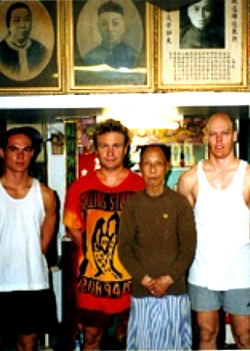 AP: Yes. I raced into my school and told four of my instructors, "Guys, you gotta meet this man who's just come back from Hong Kong. He has been studying under the master himself! You know the old black and white picture in the backroom? Well, he has learned off HIM!" Anyway, the attitude was the same: "Ha, we'll go meet this guy and see how good he is!" So off we went following morning. Sifu spent the morning grinding us to pulps, then destroyed us with Tong Long style conditioning, leaving us bruised and swollen. Then he turns around and uses Chinese dit dar to repair us on the spot. WOW! We had never seen anything like it! "Did you boys bring those spears?" he asked. He then broke one into his neck and one into his stomach to demonstrate hay gung.
AP: Yes. I raced into my school and told four of my instructors, "Guys, you gotta meet this man who's just come back from Hong Kong. He has been studying under the master himself! You know the old black and white picture in the backroom? Well, he has learned off HIM!" Anyway, the attitude was the same: "Ha, we'll go meet this guy and see how good he is!" So off we went following morning. Sifu spent the morning grinding us to pulps, then destroyed us with Tong Long style conditioning, leaving us bruised and swollen. Then he turns around and uses Chinese dit dar to repair us on the spot. WOW! We had never seen anything like it! "Did you boys bring those spears?" he asked. He then broke one into his neck and one into his stomach to demonstrate hay gung.
LL: All on the first day! Were the rest of your mates converted as well?
AP: Yes, it was then that nearly all the senior students joined him and over the years more followed. I'm proud to say I was his first student and encouraged him to start a school. I would pester him like a small boy calling him Sifu and, being the humble master that he is, he would hush me off saying he was not so good yet. He taught me the values of martial arts and the respect and discipline it takes to be true.
LL: You were very lucky to find a sifu who could teach you so much more than the fighting aspect of kung fu. Did you ever have a chance to study with Ip Shui?
AP: Yes. I have travelled to Hong Kong with Sifu and slept in Sigung Ip Shui's house in Kowloon.
LL: Incredible! This makes you almost a living legend yourself. What was this "dream vacation" like?
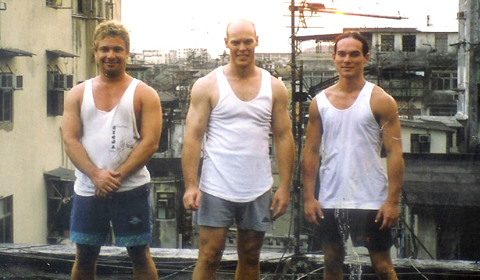
AP: It was one of the best and hardest experiences of my life. Sifu brought three of us over; we were his most senior students at that time. Sleeping on the floor in a run-down apartment was not cozy. We would be woken up in the early hours every morning to the sound of Sigung singing to his deceased wife along with some radio station that plays "music to the dead." The days were filled with kung fu training and traveling around with him. He took us to a restaurant for yum cha where other old masters also ate. Some of them had fought before in the early days of the challenge matches they used to have in Hong Kong. Sigung also traveled to Australia several times with and without his son.
LL: How did you train in Hong Kong?
AP: Every morning we would all shuffle up to the rooftops for long grueling hours of kung fu training. Looking over other rooftops you could see other people practicing kung fu and tai chi. We would also travel to their school in Mong Kok for training in the evening. Plus Sigung would often spring surprise training sessions on us where he would teach us forms, techniques, and even weaponry!
LL: You must feel very fortunate to have had these experiences. On the flip side, have you ever used kung fu for self-defense?
AP: Yes, I have used Tong Long for self defense many times before. Mainly when I was younger, as being a professional fighter I do not get into these types of situations anymore.
LL: Did you learn the more esoteric practices of dim mak or shen kung?
AP: I have learned dim mak techniques in both kung fu systems I have practiced.
LL: This is the shortest answer you've given me so far. I guess I'll just have to ask your KOed opponents if it works. Do you still practice kung fu today?
AP: I still practice my forms and some qigong. But being an MMA fighter requires a lot of training in various disciplines to make the style competent; there are hardly enough days in the week to do that, let alone practice my kung fu.
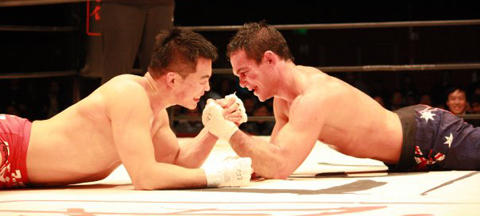
LL: I'm sure, you have to focus on more sport combat-oriented training like Brazilian Jiu Jitsu and Muay Thai for your career. Still, it is very impressive to hear a professional fighter speak so highly of his kung fu teachers and training. What are some of the most valuable and personal things you've learned from your kung fu?
AP: The most valuable lessons I have learned are to treat people with a degree of respect whilst maintaining humbleness and discipline. Each person's circumstances are different and we should all be treated with equal respect.
LL: Those are wise words, Adrian. Sounds like you have become a sifu yourself. So why did you decide on getting involved with sport combat?
AP: I chose to pursue combat competition as I wanted to test myself to see if what I was practicing actually worked against someone who was prepared to fight against me. I got tired of listening to some of my seniors saying they could "do this or that," or "this style is this and that," so I wanted to see if I could do it instead of talking about it. My brother and I have had to fight to defend ourselves from a young age, and what better way than to get to do what you love and get paid for it!
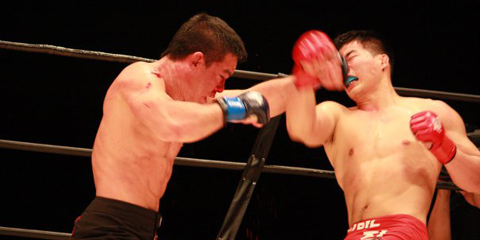
LL: With a ten-year fight career and a whopping seventeen wins, I'd say both of your reasons for getting into this sport have been justified! So when you started, you were training kung fu; was it useful in the ring and do you use it now?
AP: Kung fu is useful for self defense situations, and if I hadn't any kung fu experience, I feel perhaps I would not be in my current situation. The spear wound on my left forearm tells that story well. As for employing it now, well, a lot of martial arts have similar techniques; it's more so the application that makes it useful. I found that even wrestling has similar concepts to kung fu, so I guess you could say yes, I use it still.
LL: Can you tell me about the methods of sports combat you have pursued?
AP: I have trained in Brazilian Jiu Jitsu, Muay Thai, boxing, and wrestling. I began training BJJ under Darren McKean who is a Gracie Barra Black Belt; he had one of the tightest, most realistic games of BJJ I have ever experienced. I train Muay Thai out of Nuggets Thai Boxing Gym which is the most successful Thai boxing gym in Australia and happens to be minutes from our Integrated MMA gym. I also study wrestling under Ian Mellor, who is a freestyle wrestler from Manchester with unbelievable wrestling ability.
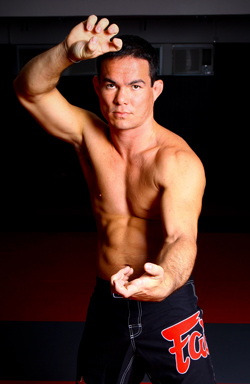 LL: That is a lot! It's a good thing you have your own gym. Who is your main instructor at Integrated MMA?
LL: That is a lot! It's a good thing you have your own gym. Who is your main instructor at Integrated MMA?
AP: My main instructor is Dan Higgins. He is the head of Integrated MMA Brisbane and a close friend of mine. He has produced many National champions in all weight classes. He has also fought around the world and is the only Australian to receive a Greg Jackson black belt. He has a passion for the sport and makes sure we are all up to date with the latest training methods and techniques.
LL: Greg Jackson is one of the most well-known and respected coaches in MMA today. He's sought after by legends for pre-fight training camps. He's trained current UFC Welterweight Champion Georges St Pierre and Light Heavyweight Champion Jon Jones, arguably two of the greatest fighters alive today. To have one of his black belts at your gym makes for a very strong team. How does your own training camp for a fight go?
AP: My training camp begins generally around 6 weeks before a fight. However, I am always in the gym and never have days off so I have a constant base level of fitness. We always have boys preparing for fights so we all need to be on our game at any moment.
Generally I will train 2-3 times per day depending on what we are doing. It's MMA so a lot of things need to be covered: striking, wrestling, BJJ, as well as strength and conditioning, not to mention diet and recovery.
LL: I feel guilty for taking the time out of your training camp now! However, I personally know you are superb when dealing with pressure. I remember when your family had just suffered huge losses during the Queensland floods right before one of your Legend FC bouts. How heavy was the damage?
AP: The floods here in Queensland were devastating, but I am fortunate I didn't have the damage that most people received. We live out of town so our driveway, which is dirt, was washed out so heavily we needed a 4x4 to get in and out. I recall not being able to train for several days as I had to dig the driveway and fill ravines deeper than myself with rocks and boulders that I pulled out of the creek beds in my property. I'm still in the process of repairing damage to my property but luckily our house remained intact.
LL: That's kind of like training - only way more stressful!
AP: When I fought in Legend 2, I was suffering the tail end of malaria. I get it sometimes during a change of extreme temperatures; it's something I got in PNG as a child. I was depleted and sweating profusely whilst having a fever while in Hong Kong, but was a good way to cut weight! [Adrian laughs]
LL: You had malaria and you still fought! You're never given a break, are you? How did you manage to focus on the fight?
AP: I was good during the fight as I knew I just had to let it all go. I was very happy with the way I fought and feel I could have finished my opponent had I been better.
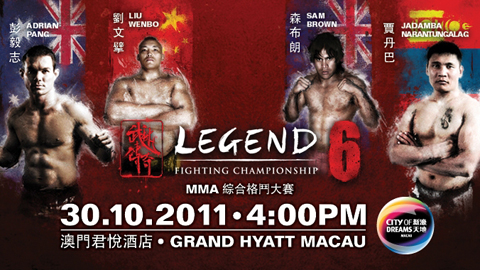
LL: Tell us about another epic saga: you've fought Yui Chul Nam twice, the first was to a draw in Legend FC 1 when you guys ended up arm wrestling after the decision, to the delight of the fans. The second time you won the decision after another battle. What strategies did you employ when you fought him a year later?
AP: Nam is a tough fighter and perhaps the largest Lightweight I have ever fought. I guess that explains his failure to make weight both times we have fought. He caught me early in our first encounter which broke my nose; he also landed several low blows which are hard to recover from! I feel the fight would have been different had those factors not occurred, so our game plan was no different for the rematch. When I re-matched him, he didn't make weight again, so it became a non-title bout. Even though it was decided that way, I feel that technically it was a title defense. I wanted to trade with him, as I had been told in an interview he was going to be too strong and knock me out. Seems to be a statement a lot of fighters make but none have delivered yet…
LL: Go The Hunter! Of course you've already had three championship belts in your career, but how does it feel to be the very first belt holder in an up-and-coming fight promotion?
AP: Winning the Legend FC title was one of the highlights of my career. The competition that LFC has is world class and I was happy to get the victory.
LL: Adrian, thank you so much for giving me this time, and I'll let you get back to training for your next fight at Legend FC 6 in Macau, China on October 30. Train hard, The Hunter! I look forward to seeing you give us a great fight!
I have a surprise for Adrian, one which I think will be another highlight for him. Following our interview, I had correspondence with his Chow Gar Sifu, Paul Brennan. Brennan Sifu had this to say:
"I took them to Hong Kong to stay with Sigung when he was alive; he lived in Kowloon City … It was really a big deal for them: living, training and eating daily with Sigung. He was very well-known here in Australia, but to stay in his home, well, you know the feeling. Adrian was young when he came to me, maybe 17. He was such a good lad, and his heart was truly martial. Not many people are like this these days. Many people do martial arts, but they only study the motion. The heart does not cultivate manner. This was not the case with Adrian. And this is why he will always go further than many. I have not said this to him, but still today I think of him as my son, my child."

No comments:
Post a Comment